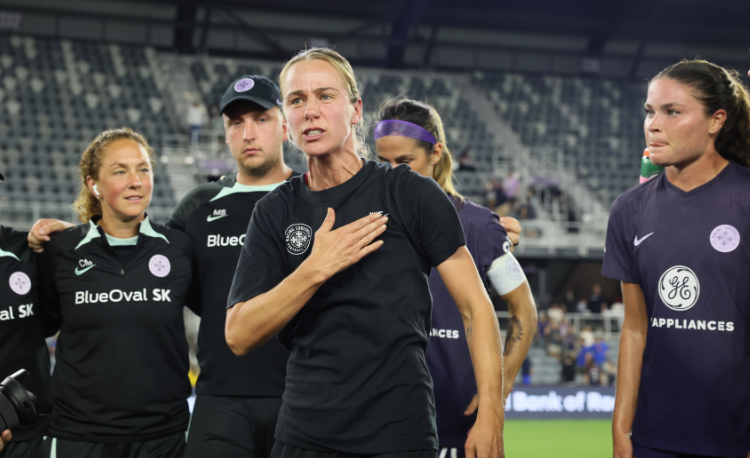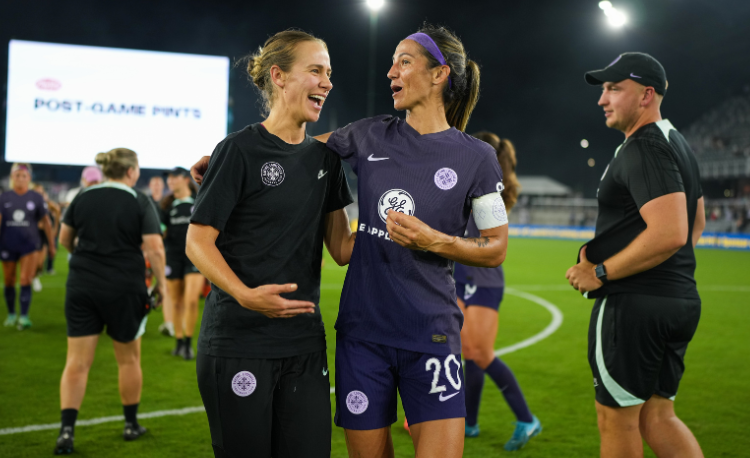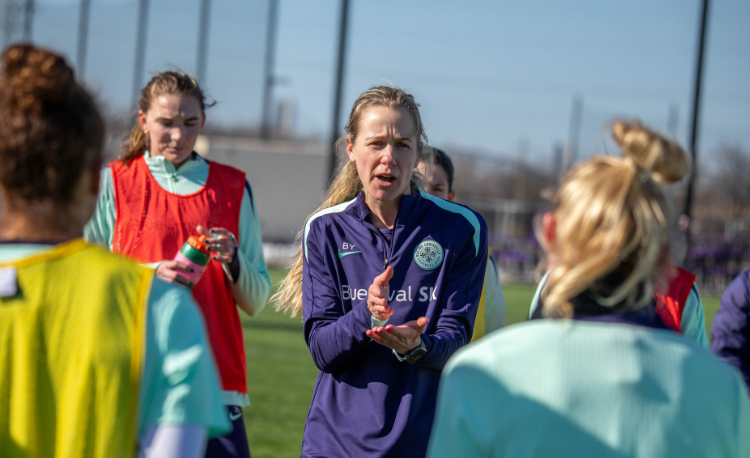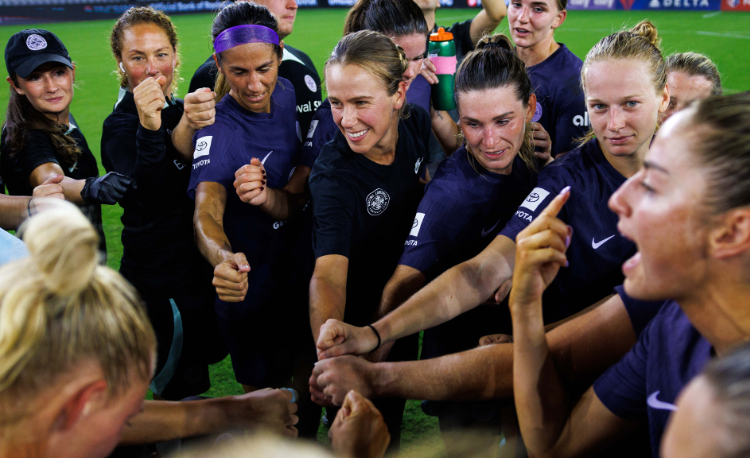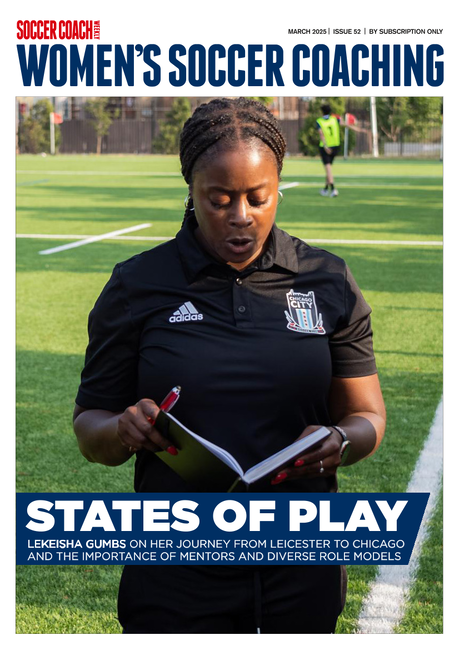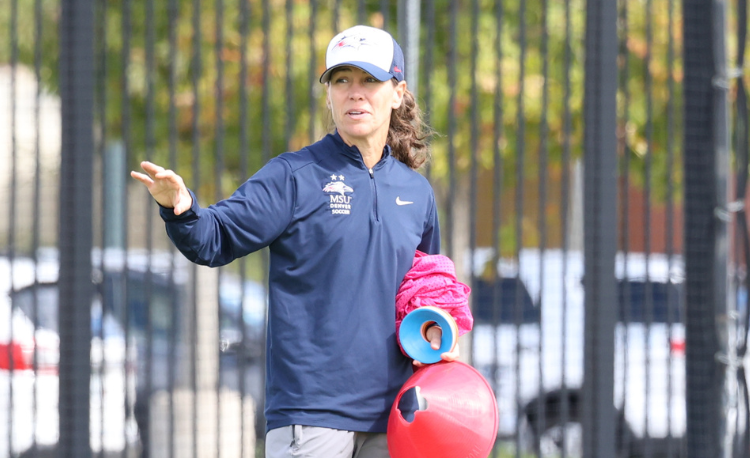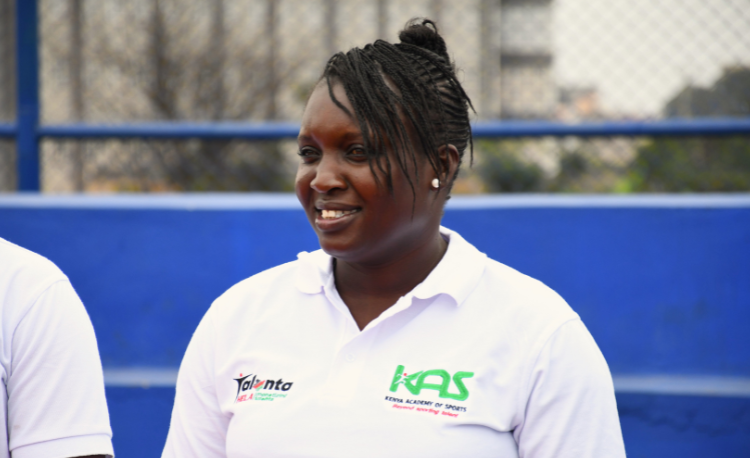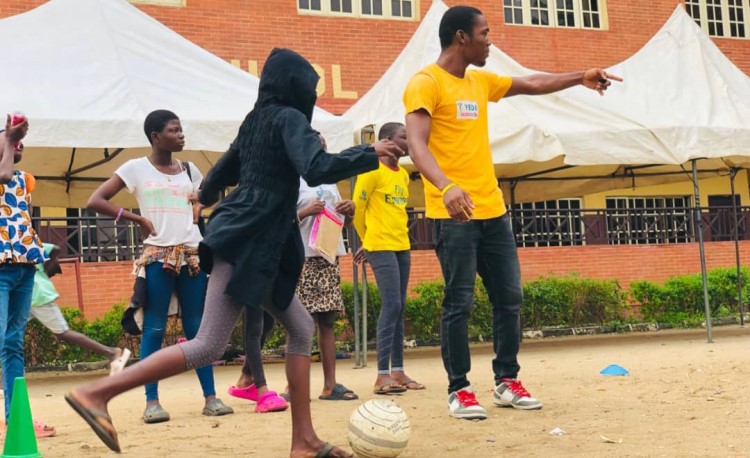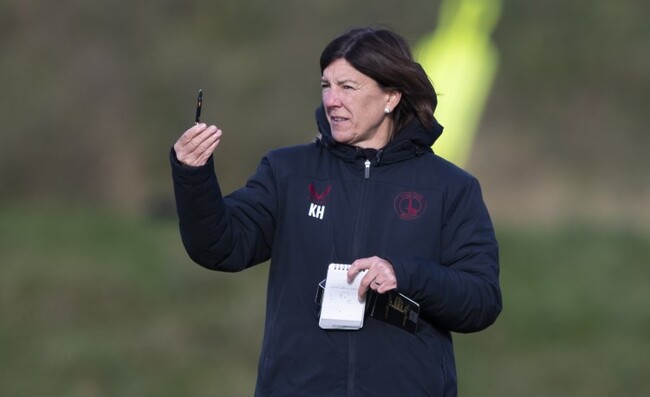You are viewing
1 of your 3 free articles
Bev Yanez: A mother's pride
Juggling her dual role as head coach of Racing Louisville and parent to two young girls, Bev Yanez is busy. But, she tells Carrie Dunn, support from her players and staff has been vital – particularly after a personal tragedy.
CONTENT WARNING: This article, and the accompanying podcast, includes references to pregnancy loss
“My new meaning in life is being a mother to these two girls. That’s my calling.”
As a parent to a four-year-old and a one-year-old – and having taken her first head coach job in 2024, at Racing Louisville – Bev Yanez is in the very early stages of a dual role that she says now defines her.
She admits life has changed since her first child (“I thought I was busy – I’m busy now!”) but is managing to juggle two very important vocations.
“I want people to see that I am a mother and I’m a head coach,” she told WSC. “I have my child here today at work. She goes into my meetings [as] she knows she gets to play with her toys during that time.
“As soon as we’re done, we go outside, she runs around the pitch and we giggle for 35 minutes.”
Despite this, Bev is keen to crush the myth of a perfect work-life balance.
“It doesn’t exist. There’s days that work gets a bigger chunk of me, 70-30.
“The next day, I find a way to go, ‘I’ve got to get out of here earlier, because my kids need me’.
“As mothers, we put a lot of pressure on ourselves to be present. It’s the only thing my heart desires – to be there for my children every single moment I possibly can.
“I take so much pride in that. But we are also making a living for our family, and doing everything that we can to put a good roof over our kids’ heads, to put clothes on our kids’ back and to put food in our kids’ mouths. I’m doing that with something that I love.”
But, with two small daughters, taking the position as head coach at an NWSL team – after three seasons as an assistant head coach, first at NJ/NY Gotham, and then Louisville – was a decision that Bev had to think over a lot.
“I was very pleased and very honored when the job was offered to me,” she said.
“I have never said this on record, but my first question was, ‘Am I going to be able to be here for my family?’.
“I feel like I’m gone all the time as an assistant. Now I’m going to go manage 26 players and a staff. Where is my family time? I’m really scared that it’s not going to exist, and, if it doesn’t exist, I’m not being who I am. If I’m not being who I am, I’m not the best head coach for this group’”.
Ultimately, of course, with the support of her close family, she took the job, and created a staff team around her that shared her vision of the game, and her commitment to the players.
That close-knit network was crucial to Bev and her family in the summer of 2024, when she experienced the horror of a miscarriage.
The tragedy happened shortly after she learned she was unexpectedly pregnant.
The communications team at the club asked whether she wanted to avoid giving publicly the reason for her absence from work. Bev was firm in her response.
“I said, ‘No. Tell everybody, because I’m heartbroken, and I want people to know that I’m heartbroken’.
“But I also want to know how many people are out there who have dealt with this, because this is so sad.
“I’m always going to wonder – what would he have been like? How tall would he have been? What color eyes would he have had? Would he have been a mama’s boy?
“So I said, ‘Tell everybody,’ and I have never been so touched in my life. I’m still getting messages. I go to games and see people and they’ll tell me, ‘I lost a child in between my two. I lost two children before I had my one.’ I hear it all the time. There’s so much pain we’ve all endured.
“So the ability to share my story…I wanted to do it for everybody to find the peace. I want more people to have discussion around it.”
Bev and Racing Louisville have since partnered with the Kentucky Fertility Institute for a fundraising drive to support women and families experiencing pregnancy loss.
All proceeds will go to Resolve, the National Infertility Association.
Bev was not away from her locker room for long – helped in large part by the positive vibes she received from her players, who, she says, are a pleasure for her to be around.
“I come in every day, I go in the room, and it’s always such a fun feeling, the music’s playing, they’re all talking,” she says.
“We have such a good group in the sense of their want to be better. That coachability, you just can’t coach [it into players].
“They’re very in tune. They want to learn. That’s what makes it so fun to coach. Our number one job is to educate. If I don’t have players that want to learn, it’s so boring.”
Related Files
Bev began her coaching journey while still a player, and believes that not only improved her technical skills, but helped her to prepare for what can often be a difficult transition into retirement for elite players.
“Age just kind of set in!” said Bev, as she reflects on the last years of her playing career. “I felt that I had so much to give still, but I just felt a different calling.
“I’ve had an opportunity to compete in this league [with Seattle Reign], and try to understand my environment, what my contributions were and what my role was in the environment.
“That being said, I’m not the type of coach that likes to say, ‘When I played...’. I think it’s very off-putting. I avoid that massively. What I try to do is understand, and be able to identify and read body language.”
Yanez has quickly identified the greater pressures placed on the head coach, compared to her previous assistant role, but has also crafted a support structure that is beneficial for her and her players.
“It weighs heavy on you when you become the head coach,” she admitted.
“You’re trying to understand, ‘How do I physically take care of 26 players on a daily basis? How do I continue to identify areas that they need to improve? How do I continue to communicate and be everything that they need as consistently as possible? How do I also manage a staff during that entire time?’.
“There’s a lot of pressure. You are a manager. You’re managing people’s emotions; you’re managing people’s futures.
“Sometimes that stress can be highly overwhelming.
“I try to use the staff around me to help connect. I try to lean on them as much as possible to create this holistic environment for the players.”
Fortunately, Yanez can lean on what she has picked up from various locker rooms and the environments she has encountered.
“A lot of my experiences, both as a player and as a coach, internationally and domestically, have really influenced the way I approach things.
“I’ve learned a lot of do’s, a lot of don’ts, and my job is to piece those together in the way that I believe the game should be played and coached and educated.”
Many might say that winning matches is the number one job of a coach. But Bev says the two should go together.
She said: “The players want to get better, they want to be good and they want to win. I want the same things.
“I want to educate as much as possible and I believe that, if I get all the processes right, the results come from it – but if I skip straight to results, I don’t think I’m investing in the right things for the right reasons for the group.
“You have to accept that you are trying to do the right things, you believe in your process and that your group has bought into your process.
“That is the only way, in due time, that results will come.”
How Japan experience launched Bev’s desire to start coaching
“Playing football is very simple – but playing simple football is the hardest thing there is.”
These are famous words from the legendary Johann Cruyff – and a motto that Bev Yanez keeps in mind at all times.
She is in the very early stages of her career as a head coach, but spent a decade playing as a forward prior to her retirement in 2020.
The bulk of her career was spent in the various US pro leagues – as Beverly Goebel, prior to marrying former MLS pro Othaniel Yanez – but she also enjoyed a lengthy stay in Japan with INAC Kobe Leonesse, as well as shorter spells in Finland and Australia.
She believes that global experience has helped her simplify the game.
“Players that play at the highest level are the best at the basics,” she said.
“They hit a long-range pass when they should. They have awareness of what space is available and exposing it, whether on the dribble or with their positioning.
“In Japan, it [was] just so technical, and their awareness and understanding of the game was so strong.”
Bev was inspired by her coach at INEC Kobe Leonesse, Kei Hoshikawa, who she says is one of the best she has played for.
“He didn’t speak a lick of English,” she smiles. “His football, his analogies, the way he played, the way he coached, the way he had us train, was so difficult on my brain.
“I remember in the first two months going, ‘How has this sport become too hard for me?’. I couldn’t comprehend the decision-making he was asking us to do.
“About four months in, it started to click. I’m seeing it as a chess board. I’m in control, giving space, taking space, the entire time, whether in possession or out of possession’.
“That’s where it started. I decided I was going to get my coaching licenses.”
Bev on going from assistant to head coach, how it changes relations with players and what she needs from her staff
Going into the 2024 NWSL season, Bev found herself in what can be a challenging position.
She was stepping up from being assistant coach to head coach, at the same club, with the same group of players, and navigating that new relationship.
“The assistant coach [role] is different,” Bev said.
“You’re there, you’re coaching the little detail, you’re pumping them up, you’re making sure you’re balancing all these pieces for them – but the head coach is the one making the decisions.”
Her own assistant coaches now are English-born Mitch Sowerby and former Canada international and FC
Nordsjaelland head coach Carmelina Moscato, a previous cover star of this magazine, whom we interviewed back in July 2021.
Between them, one works with the 6s, 8s and the back line, while the other works with the forwards.
Bev says she looks not only for quick analytical reactions, but also for good relationship-building with players.
She added: “They work very closely with those players, and are in constant communication [in terms] of what the players can continue to improve and how to improve it.
“I’m looking for them to say, ‘Hey, I spoke with her and this is how she actually likes to be coached’.
“I’m looking for them to pull off the tiny detail out of the major tactics, so that we can continue to push forward as a group.”
Newsletter Sign Up
Newsletter Sign Up
Discover the simple way to become a more effective, more successful soccer coach
In a recent survey 89% of subscribers said Women's Soccer Coaching makes them more confident, 91% said Women's Soccer Coaching makes them a more effective coach and 93% said Women's Soccer Coaching makes them more inspired.
*includes 3 coaching manuals
Get Inspired
All the latest techniques and approaches
Women's Soccer Coaching offers proven and easy to use soccer drills, coaching sessions, practice plans, small-sided games, warm-ups, training tips and advice.
We've been at the cutting edge of soccer coaching since we launched Soccer Coach Weekly in 2007, creating resources for the grassroots youth coach, following best practice from around the world and insights from the professional game.
